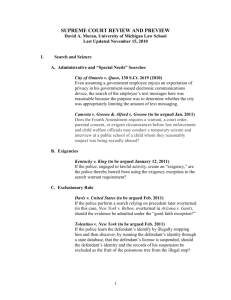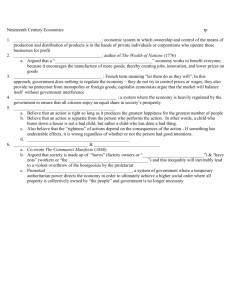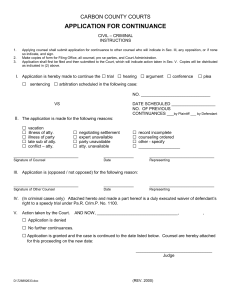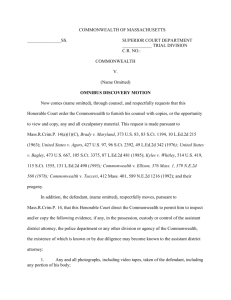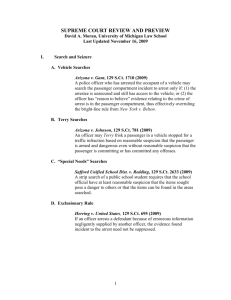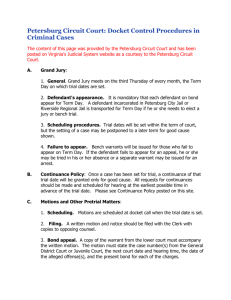Supreme Court Review & Preview
advertisement
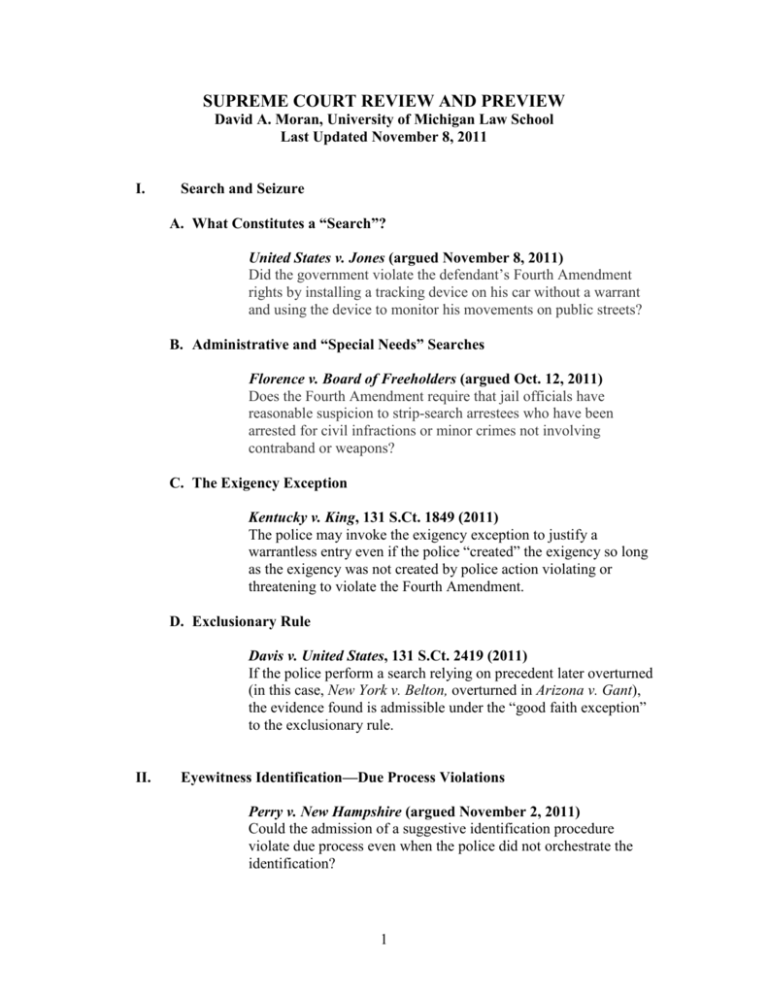
SUPREME COURT REVIEW AND PREVIEW David A. Moran, University of Michigan Law School Last Updated November 8, 2011 I. Search and Seizure A. What Constitutes a “Search”? United States v. Jones (argued November 8, 2011) Did the government violate the defendant’s Fourth Amendment rights by installing a tracking device on his car without a warrant and using the device to monitor his movements on public streets? B. Administrative and “Special Needs” Searches Florence v. Board of Freeholders (argued Oct. 12, 2011) Does the Fourth Amendment require that jail officials have reasonable suspicion to strip-search arrestees who have been arrested for civil infractions or minor crimes not involving contraband or weapons? C. The Exigency Exception Kentucky v. King, 131 S.Ct. 1849 (2011) The police may invoke the exigency exception to justify a warrantless entry even if the police “created” the exigency so long as the exigency was not created by police action violating or threatening to violate the Fourth Amendment. D. Exclusionary Rule Davis v. United States, 131 S.Ct. 2419 (2011) If the police perform a search relying on precedent later overturned (in this case, New York v. Belton, overturned in Arizona v. Gant), the evidence found is admissible under the “good faith exception” to the exclusionary rule. II. Eyewitness Identification—Due Process Violations Perry v. New Hampshire (argued November 2, 2011) Could the admission of a suggestive identification procedure violate due process even when the police did not orchestrate the identification? 1 III. Confessions--Miranda Issues J.D.B. v. North Carolina, 131 S.Ct. 2394 (2011) For purposes of the Miranda objective test to determine whether a suspect reasonably believes he/she is in custody, the court should take into account that the suspect is a child (13 years old in this case). Howes v. Fields (argued October 4, 2011) Is a prisoner in custody for purposes of Miranda if he is incarcerated for an offense unrelated to the subject of the questioning when he is taken to an isolated area of the prison facility and questioned about conduct occurring outside the prison? IV. Double Jeopardy Blueford v. Arkansas (to be argued January 2012) If the judge discharges a hung jury without taking a formal partial verdict after the jury announced that it unanimously agreed the defendant is not guilty of the highest charge and that it was deadlocked only on a lesser charge, may the defendant be retried on the highest charge? V. Right to Counsel A. Scope of the Right Turner v. Rogers, 131 S.Ct. 2507 (2011) A defendant does not generally have the right to counsel before being incarcerated for civil contempt (in this case, for failing to pay child support), but may be entitled to counsel if the case presents unusual complications. Martinez v. Ryan (argued October 4, 2011) If a state prohibits a defendant from raising a claim of ineffective assistance of trial counsel on direct appeal, does the defendant have the right to the effective assistance of post-conviction counsel when post-conviction counsel raises a claim of ineffective assistance of trial counsel in a state post-conviction proceeding? 2 B. Ineffective Assistance of Counsel Harrington v. Richter, 131 S.Ct. 770 (2011) Trial counsel was not ineffective for failing to obtain blood spatter experts since the importance of the blood evidence did not become apparent until the beginning of trial, counsel instead attempted to create reasonable doubt through cross-examination of the prosecution’s experts, and the defense experts would not likely have changed the outcome. Premo v. Moore, 131 S.Ct. 733 (2011) When a defendant who entered a guilty plea argues ineffective assistance of counsel because his attorney failed to move to suppress the defendant’s involuntary confession, the Fulminante rule that the admission of an involuntary confession is never harmless error is irrelevant to the issue of whether the defendant would still have pleaded guilty even if his confession had been suppressed. Missouri v. Frye & Lafler v. Cooper (argued Oct. 31, 2011) Does the 6th Amendment provide a remedy for a defendant who rejected a plea as a result of deficient representation during plea bargaining and who was subsequently convicted and sentenced after a fair trial (Cooper) or who subsequently accepted a less favorable offer (Frye)? VI. Miscellaneous Trial Issues A. Confrontation Rights—Testimonial Evidence Michigan v. Bryant, 131 S.Ct. 1143 (2011) Applying a multifactored test taking into account, among other things, the intent of both the declarant and the interrogators, the crime at issue, and the use of weapons, a statement from a wounded victim identifying his perpetrator to police officers on the scene was responsive to an “ongoing emergency and therefore not “testimonial” within the meaning of Crawford v. Washington. Bullcoming v. New Mexico, 131 S.Ct. 2705 (2011) The right of confrontation is not satisfied where a lab report is introduced but the analyst who made the testimonial statements contained in the lab report does not testify, even if a “substitute” analyst testifies. 3 Williams v. Illinois, (to be argued December 6, 2011) Whether a state rule of evidence allowing an expert witness to testify about the results of DNA testing performed by nontestifying analysts, where the defendant has no opportunity to confront the actual analysts, violates the Confrontation Clause. B. Prosecutorial Misconduct—Brady Violations Smith v. Cain (argued November 8, 2011) Was the defendant denied a fair trial by the cumulative effect of numerous pieces of exculpatory evidence withheld by the police and prosecutors? VII. Sentencing A. Cruel and Unusual Punishment Kuntrell v. Hobbs & Miller v. Alabama (to be argued Feb 2012) Is life without the possibility of parole a cruel and unusual punishment for a 14-year old convicted of murder? VIII. Post-Conviction Relief A. Post-Conviction Access to Evidence Skinner v. Switzer, 131 S.Ct. 1289 (2011) A prisoner may bring a § 1983 action (as opposed to a federal habeas corpus petition) to argue that a state is violating his Due Process right to access and test potentially exculpatory DNA evidence. B. Evidentiary Hearings in Federal Court Cullen v. Pinholster, 131 S.Ct. 1388 (2011) In reviewing the merits of a decision made in state court, a federal district court is limited to the evidence presented to that state court and may not consider evidence produced for the first time in an evidentiary hearing in federal court. C. AEDPA Statute of Limitations and Tolling Wall v. Kholi, 131 S.Ct. 1278 (2011) 4 A motion for discretionary sentence reduction filed in the state trial court is a petition for “collateral review” and therefore tolls the time for filing a federal habeas petition. Gonzalez v. Thaler (argued November 2, 2011) When does the time for taking further direct review expire and, therefore, the time for filing a federal habeas petition begin to run in a case in which the defendant does not pursue an appeal to the state’s highest court? Wood v. Milyard (to be argued January 2012) May a federal appellate court raise the statute of limitations defense sua sponte, and does the State’s statement that it would not contest the timeliness of the petition constitute a waiver of a statute of limitations argument? D. Procedural Default Maples v. Thomas (argued October 4, 2011) Was there “cause” to excuse petitioner’s procedural default in failing to timely file an appeal to the state’s highest court after the intermediate appellate court mailed the decision to his lawyers’ firm, which erroneously returned the mail to the appeals court without opening it or notifying petitioner? E. AEDPA Standards of Review Harrington v. Richter, 131 S.Ct. 770 (2011) A state decision summarily rejecting an ineffective assistance claim is still entitled to AEDPA deference and should be upheld unless no reasonable jurist would conclude that counsel provided effective assistance. Greene v. Fisher, 132 S.Ct. ____ (Nov. 8, 2011) A decision of the U.S. Supreme Court issued after the last state court decision on the merits but before the conclusion of direct review is not “clearly established law” for purposes of federal habeas corpus review and, therefore, cannot be invoked on habeas. 5
